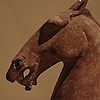- Old Texts
-
In Chinese philology, the Old Texts (Chinese: 古文经; pinyin: Gǔwén Jīng; Wade–Giles: Kuwen Ching) refer to some versions of the Five Classics discovered during the Han Dynasty, written in archaic characters and supposedly produced before the burning of the books, as opposed to the Modern Texts or New Texts (今文經) in the new orthography.
The last half of the 2nd century BC was the period when new versions of the Confucian classics were discovered. Most of these new versions were found in the walls of Confucius’s old residence in Qufu, the old capital of State of Lu, when, Prince Liu Yu (d. 127 BC) attempted to expand it into a palace upon taking the throne there. In the course of taking the old wall apart, the restorers found old versions of the Classic of History, Classic of Rites, Analects of Confucius and Classic of Filial Piety, all written in the old orthography used prior to the reforms of the Clerical script. Hence they were called “old texts”. These newly discovered editions had an effect on later Confucianism.
Contents
Controversy among new schools
By the time of 1st century, a new controversy had begun between these two texts. The "new texts" are those that had been transliterated into the new orthography back in the beginning of 2nd century BC, either from oral transmissions or from texts that had survived the Qin Dynasty’s burning of the books or were rescued by the Han Dynasty in the provinces. Surviving scholars in the direct line of transmission of these books got hold of surviving copies and transliterated them into the new orthography.
The "old texts" were the ones that off and on since the late 2nd and during the 1st century BC had turned up, some discovered in the walls of Confucius’s residence, or in Warring States period graves. They were called the “old texts” because they were written in the pre-Qin writing. The discoverers of the "old texts" claimed that all existing texts suffered from an interrupted pedigree, which was rectified by the newly discovered texts.
In reality, the burning of the books probably did little more than symbolically burn a few copies of the Confucian books conveniently at hand in the capital.[citation needed] Many other copies survived elsewhere, and these were available for copying into the new orthographic standard set by Qin and its clerk script successor which evolved under Han Dynasty. It was the change in orthography which divided the Warring States and early imperial period textual traditions, and in this respect the newly discovered texts were no different from those used as the basis for the "new text" transcriptions soon after the fall of Qin Dynasty.
These “old texts” had a peculiarly archaist bent. They emphasized the sage-like as opposed to the philosopher-like characteristics of Confucius, thereby making him look more like the earlier sages who founded and ruled Zhou Dynasty or even the still more archaic states which preceded it. And yet, these archaic sage-kings are shown ruling China with a bureaucratic apparatus peculiarly like that available to Han Dynasty rulers, and hence by methods which strikingly echoed those of putative enemies of Wang Mang, the modernists. The Former Han (206 BC-AD 8), prior to Wang Mang, had favored New Text while Later Han (AD 25-220) scholars favored the Old Text versions. Eventually the Old Texts became the Confucianist canon and the controversy between the two schools was forgotten until it was rediscovered during the Qing dynasty by Han Learning scholars.
Modern interpretations
Significance of the old/new text controversy is a debate topic in the modern sinology. Martin Kern claims that the issue itself was an artificial projection of the mid-Han problematic onto the early Han realities. According to him, the issue should be seen in light of the transition from the self-referential ritual tradition (centered on the oral and multimedia practices) to the literary canon.[1]
Notes
See also
Sources and external links
- The History of Classical Scholarship. Stuart V. Aque (a chapter from his doctoral dissertation at the University of Washington). (PDF)
- Nylan, Michael, 'The Chin wen/Ku wen Controversy in Han Times' in: T'oung Pao, 80 (1994), p. 83-145. A thorough and detailed study of the jinwen/guwen designation, distinction, and related topics.
- Ess, Hans Van, 'The Old Text/New Text Controversy. Has the 20th Century Got It Wrong?' in: T'oung Pao, 80 (1994), p. 146-170. A study that addresses the views of modern scholars.
Confucian Texts The Four Books The Five Classics The Three Commentaries The Thirteen Classics Classic of Poetry • Classic of History • Rites of Zhou • The Ceremonies and Rites • Classic of Rites • Classic of Changes • The Commentary of Zuo • The Commentary of Gongyang • The Commentary of Guliang • The Analects • Luxuriant and Refined Words • The Classic of Filial Piety • The MenciusOther Han Kitab • Interactions Between Heaven and Mankind • Old Texts • The Twenty-four Filial ExemplarsHan Dynasty topics History Chu-Han contention · Feast at Hong Gate · Lü Clan Disturbance · Sino-Xiongnu War · Rebellion of the Seven States · Sino-Roman relations · Xin Dynasty · Chimei · Goguryeo–Han Wars · First Chinese domination of Vietnam · Second Chinese domination of Vietnam · Disasters of Partisan Prohibitions · Way of the Five Pecks of Rice · Yellow Turban Rebellion · End of Han
Society and culture Government Three Lords and Nine Ministers (Nine Ministers · Three Ducal Ministers) · Four Commanderies · Protectorate of the Western Regions (Chief Official) · List of emperors of the Han DynastyEconomics Science and technology Categories:- Chinese classic texts
- Confucianism
- Confucian texts
Wikimedia Foundation. 2010.
